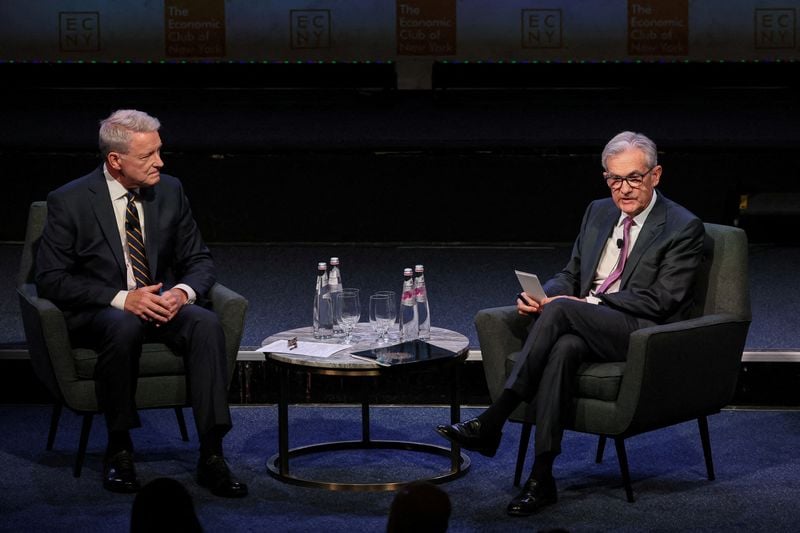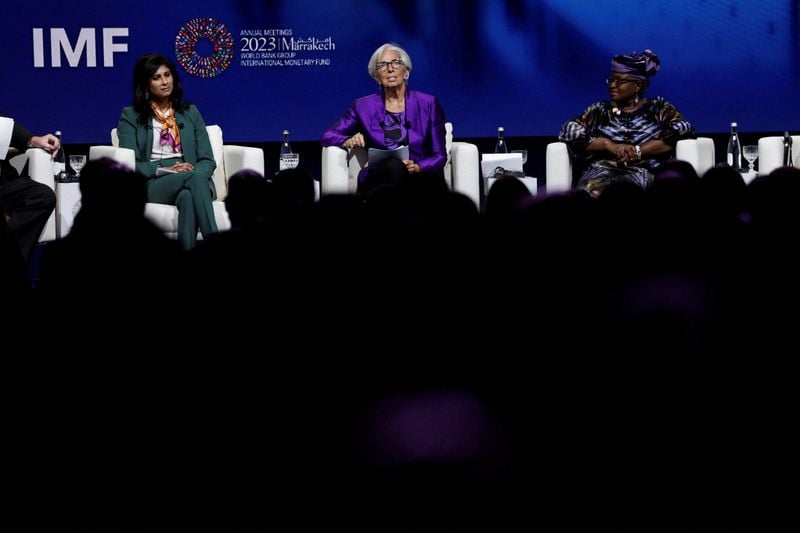By Mark John
(Reuters) – After months playing catch-up with inflation, central bankers were starting to believe they have finally pegged interest rates at just about the right level to keep a lid on prices without completely throttling the economy.
Now, to complicate matters for a professional caste which prides itself on being data-driven, the Middle East is throwing a new set of real but unquantifiable risks into their equations.
“It’s not about knee-jerk. It’s not about looking through or not through. You have to form some sort of assessment of … an oil price at $150 barrel,” Bank of England chief economist Huw Pill told an event this week of one scenario if hostilities between Israel and Hamas start to escalate.
A big jump in energy costs is just one way the conflict could make itself felt as it looms large among clouds which U.S. Federal Reserve Chairman Jerome Powell acknowledged on Thursday “pose important risks” to the global economy.
While any impact may be minor next to the human tragedies in the conflict zone itself, it would be bad news for a weakened global economy which, in the words of the International Monetary Fund, is already just “limping” along.
Unless the picture changes dramatically in coming days, the European Central Bank, U.S. Federal Reserve, Bank of England and Bank of Japan are already expected to keep their policy rates on hold in meetings over the next two weeks.
The Fed and ECB both see a chance to tame inflation without triggering outright recession by holding rates at current levels for months – a “high for longer” gambit now convincing markets to push back bets on first rate cuts to mid-2024 and beyond.
That calculation has, so far, not been shaken by the 10% rise in oil futures to around $94 since Hamas’ Oct. 7 strike on Israel – a gain which adds a tenth of a percentage point to the “core” measure of underlying inflation watched by central bankers.
‘MUDDYING THE WATERS’
Bigger questions emerge, though, in the $150 oil scenario cited by Pill, or indeed if it hits the $130 highs reached in the days after Russia’s invasion of Ukraine in February 2023.
Such outcomes would for example come into view in the event that Hamas ally Iran retaliated by disrupting energy flows from OPEC neighbours via the Strait of Hormuz.
Europe is exposed because, unlike the United States, it has no substantial domestic oil production. Higher gas prices would also feed into inflation although, for now at least, it has plenty of gas in storage.
ECB rate-setter Yannis Stournaras, the governor of the Greek central bank, argued that Europe had broadly managed to absorb the effects of rising energy costs triggered by the Ukraine war and hoped it could do the same if further shocks emerged.
“It will depend on the duration, it will depend on whether it’s going to be extended or it’s going to be local,” he told Reuters, adding that as a rule, conflicts added to inflation while weakening overall economic activity.
Further unknowns include how the uncertainty affects the morale of consumers and investors and how it plays into the mindsets of companies and workers in future wage-setting.
“When uncertainty is so high, it’s hard to say how next year’s wage talks will play out,” said Tetsuya Hiroshima, the Bank of Japan branch manager overseeing the Tokai central Japan region that is home to auto giant Toyota Motor Corp.
“Many firms are now at a stage where they want to carefully gauge the profit outlook,” he told a news conference this week, referring to their stance in upcoming pay negotiations.
In Europe, concerns that Israel-Hamas conflict could play out on its soil were raised by EU migration ministers this week and analysts said travel and tourism sectors would be among the first to see a slowdown if fears of spill-over increased.
For now, the conflict remains largely confined to Israel and Gaza, something S&P Global Market Intelligence said in a study this week was already “muddying the waters” for central banks.
As the Fed’s Powell put it: “Our institutional role at the Federal Reserve is to monitor these developments for their economic implications, which remain highly uncertain”.
(Additional reporting by Dan Burns in Washington, Balazs Koranyi and Francesco Canepa in Frankfurt, Maria Martinez in Berlin, Leika Kihara in Tokyo, Kevin Yao in Beijing and David Milliken in London; Editing by Tomasz Janowski)

